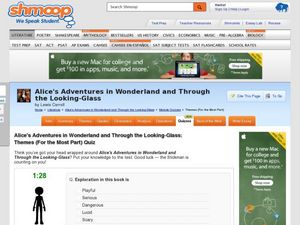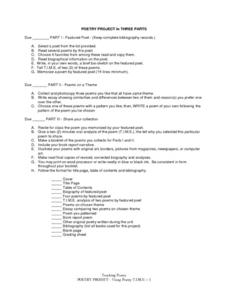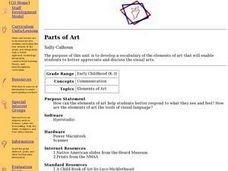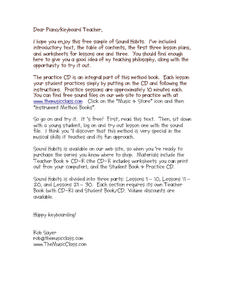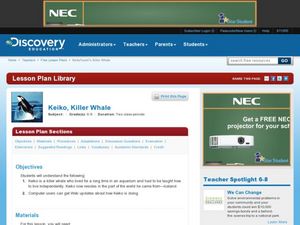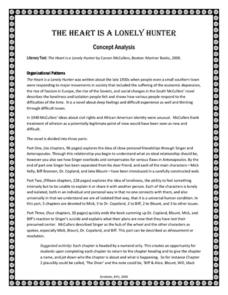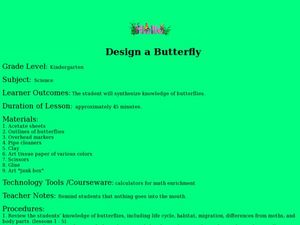Curated OER
Moon Phase Flip Books
What better way to study the moon phases than to see them in action? The directions on the handout only have kids cut out and tape on the moon phases to make the flipbook, but it would be even more powerful to include the name of each...
Curated OER
One Size Fits All, Part 1
Can you tell how tall someone is just by looking at their feet? In this activity, young mathematicians measure their height, arm span, and foot size, graph their findings, and answer questions about how these measurements are related....
Curated OER
Alice's Adventures in Wonderland and Through the Looking-Glass: Themes (For the Most Part) Quiz
Offer your learners some extra review with an online interactive reading comprehension exercise. They may respond to 5 multiple-choice questions based on the themes of Alice's Adventure in Wonderland and Through the Looking-Glass....
Curated OER
New York State Testing Program English Language Arts Test Book 2-Grade 8 (2010)
Get ready for state testing with this resource, which focuses on listening and writing skills. While a complete description of the writing assignment is provided here, the listening portion is not included. You could use the graphic...
Curated OER
Questions for The Book The Giving Tree
Are you studying Shel Silverstein? Focus on The Giving Tree and talk about selflessness in your class. In this online interactive quiz, pupils respond to eleven multiple-choice reading comprehension questions on this particular...
Teaching English
Poetry Project in Three Parts
It’s poetry T.I.M.E! Individuals use the T.I.M.E. format (T = Title, thought, and theme; I = Imagery and figurative language; M = music and sound; E = emotion) to study a poet, collect poems that have a similar theme, and create a...
Curated OER
Parts of Art
Young scholars define and use new vocabulary associated with the elements of art. As a class, they brainstorm different ways in which we communicate with one another. In groups, they view different pieces of art from the Native American...
Curated OER
Fall 2004 Midterm Exam #1, Parts A & B
First year physics learners show what they know about electric potential, circuits, power, current, and voltage on this midterm exam. It consists of a multiple choice section, some true or false questions, and two multi-step problems to...
Curated OER
3-D Figures Part 1
Elementary schoolers explore 3-D shapes. They transition from thinking of shapes as only 2-D. Pupils read Cinderella as a launching activity for their upcoming adventure, and explore a new world of 3-D shapes in this introductory lesson.
Curated OER
Using a Table of Contents
While simple, this resource would be a great way to introduce your class to the use of the Table of Contents. It provides a step-by-step explanation describing how to find information. A teacher could supplement this presentation with...
Curated OER
Where the Red Fern Grows Chapter 19-20
Take a look at the final chapters of Wilson Rawls' much-loved novel. Class members respond to several plot-based questions and then consider the red fern as a symbol. The worksheet is part of a series that includes every chapter except...
Music Class
Sound Habits
Hear ye! Hear ye! Encourage your young keyboard/piano players to develop sound habits with a resource packet that introduces a dynamic learning method. The free sample lessons, part of a for-purchase program, are designed to be used in a...
Curated OER
Keiko, Killer Whale
Middle schoolers will create a children's book on Keiko, the killer whale, that was rehabilitated and returned to the wild after living in an aquarium. In small groups, they conduct internet research to find out the history and current...
Curated OER
Study Guide for Where the Red Fern Grows
One of the best fourth grade books of all time is Where the Red Fern Grows. Provide your class with interesting background on the book and the author as well as worksheets for every five chapters of the novel. The first part of the guide...
Curated OER
The Tale of Peter Rabbit
Wow! Here is a most-impressive series of lessons and activities that revolve around the classic story, The Tale of Peter Rabbit. The purpose of the lessons are to provide an agricultural theme in the reading, writing, and science...
Novelinks
The Heart Is a Lonely Hunter: Concept Analysis
Considering Carson McCullers' The Heart Is a Lonely Hunter for whole-class reading or as a selection for book circles? Check out this resource that overviews the organizational patterns, themes, plot structure, tone, and setting.
Baylor College
Fuel for Living Things
During a three-part lesson plan, learners make a cabbage juice pH indicator and use it to analyze the waste products of yeast after feeding them with sugar. The intent is to demonstrate how living organisms produce carbon dioxide, which...
Baylor College
Neurotransmitters Contain Chemicals
Human body systems young scholars play a card game, "Locks & Keys" in order to learn that neurotransmitters carry a message from one neuron to another by fitting into a receptor site on the receiving nerve cell. While this activity...
Baylor College
Drugs, Risks and the Nervous System
In cooperative groups, middle schoolers contemplate the probability of 18 different situations occurring. After they make predictions, they compare them to the actual risk factors. This eye-opening exercise demonstrates that the odds of...
Baylor College
Can Nutrients in Water Cause Harm?
Ecology candidates culture pond water organisms over a few days time, then they experiment to find out how increasing nutrients affects the population. As part of a unit on water, this exploration gives your class an understanding of how...
Curated OER
Design a Butterfly
Students access prior knowledge of butterflies. In this butterfly lesson plan, students create butterflies and compare and contrast their butterflies. Students describe the various body parts.
EngageNY
Developing Reading Fluency: Criteria for Reading Aloud
Third graders develop their reading superpowers in a lesson plan on fluency. After first listening to an audio recording or teacher read aloud, the class works together identifying criteria for fluent reading, focusing on phrasing, rate,...
Baylor College
Rainbow in the Room
Uncover the science behind the beautiful phenomena of rainbows with a simple demonstration. Shine light through different-sized containers of water as young scientists learn that rainbows occur when visible light is split up into its...
Baylor College
Moving Air
In lab groups, young scientists place aluminum cans with a bubble-solution cap into different temperatures of water to see what size of bubble dome forms. As part of an atmosphere unit in preparation for learning about convection...


